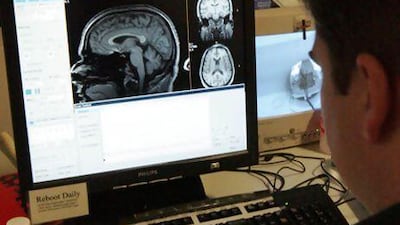Covid-19 can hide in the brain, and is possibly a cause of lingering symptoms, according to guidance issued by the World Health Organisation (WHO).
Research suggests as many as one in 10 people suffer from long Covid – a poorly understood condition that leaves those affected with lasting effects of the virus.
Symptoms include, but are not limited to: fatigue, shortness of breath, cough, muscle pain and confusion and disorientation.
Research suggests around a quarter of people with the virus experience symptoms for at least a month.
Around one in 10 are still unwell after 12 weeks, and in some cases for much longer.
Sufferers say the condition is debilitating.
"We are beginning to understand why people get these symptoms," wrote Professor Martin McKee, research director of the European Observatory on Health Systems and Policies, an intergovernmental partnership.
There could be numerous causes, he said in a research paper shared by WHO.
“They include persistence of the virus in some parts of the body that are sheltered from the immune system, such as the brain,” he wrote.
Prof McKee clarified the statement on Twitter, saying there was "no strong evidence" that a persistent infection in the brain was a major mechanism in long Covid.
But it is one possible factor.
Studies have shown the virus can indeed infect the brain, and it is believed to do so by entering via the nose.
This is what an autopsy study concluded last November, when researchers discovered coronavirus particles intact in cells located at the roof of the nose, along with evidence of “active replication in the tissue”.
They said from there the virus could access the olfactory bulb – the neural structure in the front of the brain involved in the sense of smell – and travel via specific cranial nerves deep into the brain.
Writing in Nature Neuroscience, they proposed that the mechanism could explain the loss of taste and smell, which is a symptom frequently associated with Covid-19 infections.
However, they also found the virus in other areas of the brain, suggesting it may access it via other routes, too – such as the mouth.
Why mice might provide the answer
Covid-19’s ability to infect the brain is not unique.
Ebola is known to evade the immune system by retreating to tissues where the immune system is not as active, only to re-emerge later and wreak havoc once again.
In 2015, Scottish nurse Pauline Cafferkey, who had recovered from Ebola a year previously, developed meningitis due to the virus, after it hid in her nervous system. She survived.
It is not known how long Covid-19 infects the brain and not all forensic autopsy studies have found it there.
Experiments in mice – which share many of the same genes with humans – have shown the virus lingering for a long time.
Findings in mouse studies do not always translate to humans. But researchers suspect in this case they might.
"Our brain doesn't have that good an immune response, like our lungs or our heart, so whenever the virus [Covid-19] goes in the brain, it can replicate very well," Mukesh Kumar, a virologist at Georgia State University who carried out the experiments in mice, told Business Insider.
"It can stay there for a long time.
"Depending upon your immune response or antibody levels, it could cause low levels of inflammation, or maybe make you prone to other disease, or maybe reactivate later," Mr Kumar said.
"All these are still outstanding questions because we are still only one year into the pandemic."







